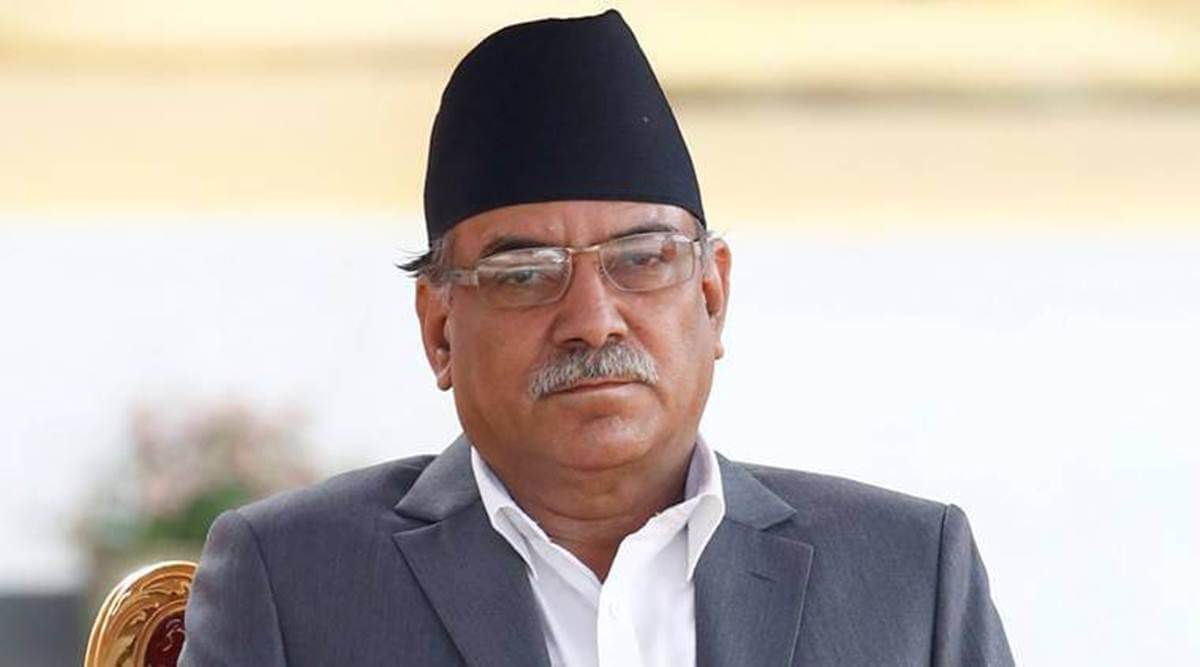Former Nepalese Prime Minister (PM) and Communist Party of Nepal (Maoist Centre) chief Pushpa Kamal Dahal, popularly known as Prachanda, called for an early resolution of the border dispute between India and Nepal through “diplomatic efforts and dialogue” to ensure “problem-free” relations between the historic allies.
During an address on the theme “Nepal-India Relations: Prospects for Deepening Friendship and Cooperation” at the Indian Council of World Affairs on Saturday, the former PM said the two “friendly neighbours” are aware of each other’s “concerns and sensitivities,” and urged them to overcome their misunderstandings through “mutual trust and respect” in order to protect their “harmonious co-existence.”
He stressed, “Nepal has not allowed its land to be used against the interests of our neighbors and it expects similar assurance from India.” Hailing their “deep and diverse” ties, he said the two countries are bound by “age-old, time-tested, and multidimensional ties” that are rooted in connections through literature, water bodies, history, and interpersonal exchanges.
Pleased to welcome @cmprachanda to India on his visit at the invitation of BJP President @JPNadda ji.
— Dr. S. Jaishankar (@DrSJaishankar) July 16, 2022
A productive discussion on strengthening our neighbourly relationship with a focus on economic cooperation. pic.twitter.com/GDA6G9cBff
Prachanda underscored that the current coalition, led by PM Sher Bahadur Deuba, “attaches great importance” to ties with India and recommended expanding engagement via agriculture, railways, and energy pipelines. He also spoke of the need to address Nepal’s “alarming” major trade deficit with India in order to “fully realise Nepal’s export potential,” describing India’s development as “spectacular and inspiring.”
He also touched on various existing projects between India and Nepal, noting that Kathmandu has “prioritized connectivity infrastructures – including roads, railways, waterways and transmission lines.”
The two countries are also working together to establish integrated check posts (ICPs) and railway linakes. He added that Nepal also possesses “immmense potential” in hydropower generation, which could generate regional energy security.
Furthermore, they are looking to ‘scale up’ religious tourism via the Ramayan and Buddhist ‘Circuits.’
"There are some issues left by history that need to be addressed in good faith to fully realize full potentials of Nepal-India relations and cooperation", says Chairman of Communist Party of Nepal (Maoist Centre), Pushpa Kamal Dahal ‘Prachanda' in Delhi pic.twitter.com/LWPfW6IXA2
— Sidhant Sibal (@sidhant) July 17, 2022
Prachanda proclaimed that Nepal is set to leave behind its least developed country (LDC) status by 2026 but noted that the COVID-19 pandemic has caused major economic and social upheaval.
In this regard, the former PM welcomed India for ensuring an “unhindered supply of goods, medical supplies, including fertilisers, and much-needed vaccines” and also thanked New Delhi for its “swift, spontaneous, and substantial” assistance following the 2015 earthquake.
He also thanked India for its ‘Neighbourhood First’ policy and celebrated its leadership role via the International Solar Alliance, the Coalition for Disaster Resilient Infrastructure, and the World Health Organization Global Centre for Traditional Medicines, the G20, and BRICS.
Chairman of Communist Party of Nepal (Maoist Centre) Pushpa Kamal Dahal ‘Prachanda’ meets president of India's ruling BJP party JP Nadda & EAM Jaishankar at BJP HQ in Delhi pic.twitter.com/8OwUk07ARz
— Sidhant Sibal (@sidhant) July 17, 2022
Taking all of this into consideration, Prachanda hailed Deuba’s visit to India in April and Modi’s visit to Nepal in May for “generating a new momentum in our relations.” However, he said there remain “some issues left by history that need to be addressed in good faith to fully realise [the] full potential” of bilateral ties, referring to the Eminent Persons’ Group’s (EPG) report, which suggested that the two sides’ ties should be looked evaluated and revamped, including the 1950 Treaty.
The EPG’s report was published in 2018 by the eight-member group of representatives from both Nepal and India. While the exact details of the document have not been made public yet, reports suggest that it recommends a complete overhaul of India-Nepal relations, including mandating identity cards for cross-border travel and strengthening cooperation in combatting terrorism, extremism, and other common challenges.
“Issues between Nepal and India should be resolved diplomatically” https://t.co/REmvGf0Xor
— ☭ Comrade Prachanda (@cmprachanda) July 17, 2022
The long-dormant border dispute between India and Nepal was revived in 2020 after Kathmandu, under the leadership of former PM KP Sharma Oli, published a map in the Parliament that showed three Indian territories—Limpiyadhura, Kalapani, and Lipulekh —as a part of Nepal. India retorted and warned Nepal against such “unilateral acts” and “artificial enlargements.”
Prachanda made the plea for reconciliation during a three-day visit to India last week, which came at the invitation of JP Nadda, the President of India’s ruling party Bharatiya Janata Party (BJP).
During his trip, he also met with Nepalese Ambassador Shankar Prasad Sharma, Indian External Affairs Minister S. Jaishankar, National Security Advisory Ajit Doval, BJP Foreign Affairs Chief Vijay Chauthaiwale. He was also scheduled to meet with Indian PM Narendra Modi. However, the meeting was cancelled at the last moment.
Today Shri @cmprachanda ji visited BJP HQ to meet Party President Shri @JPNadda ji. Both the leaders have warm exchange of information and views about bilateral relations. Shri Nadda ji elaborated to him structure of the party and also informed him about new party HQ. pic.twitter.com/kjED7erW01
— Dr Vijay Chauthaiwale (@vijai63) July 17, 2022
After the former leader’s visit to the BJP head office in New Delhi, Chauthaiwale said, “Prachanda said that though the BJP and his party follow different ideologies, the common goal of both is upliftment of the poor.” He also celebrated the central position given to Nepal in India’s neighbourhood first policy.
The meetings were organised in pursuance of India’s “Know the BJP” initiative, through which the party has been seeking to bolster ties with political parties across the world.
Prachanda has previously served as Nepal’s Prime Minister twice, during which he enjoyed close ties with political leaders in India. Meanwhile, China is seeking to strengthen and bring back the Nepal Communist Party, led by former PM KP Sharma Oli.

